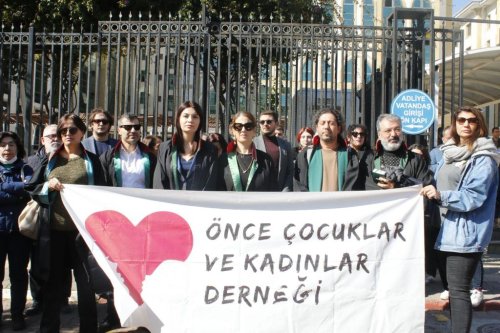Photo:csgorselarsiv.org/Emre Orman
Click to read the article in Turkish
Hüseyin Can G. was sentenced to an aggravated life sentence in the murder case before for killing 16-year-old Sıla Şentürk in Giresun by cutting her throat. He was standing another trial for previous offenses against the same victim.
Yesterday(February 21) he received 16 years and 8 months of a prison sentence for "sexual abuse of the child" and 3 years and 1 month for "depriving a person of liberty" in this second law case.
The court minutes from yesterday's trial show that the male perpetrator got a sentence reduction for a "respectful attitude in the courtroom."

Perpetrator: "Do not implement the İstanbul convention"
Sıla Şentürk's Lawyer Hediye Gökçe Baykal, from the First Children and Women Association, told bianet that it was not possible to understand the reduction.
"The perpetrator killed Sıla by cutting her throat and received an aggravated life sentence in the murder case. The suspect and his lawyer claimed throughout the trial that the suspect was not in good mental health but the final report that arrived from the Forensic Medicine Institution it was determined that he had no mental health problems," Baykal reminded.
The suspect had told the court that we were no longer party to the İstanbul Convention and that the Convention could not be implemented. And also later that the Forensic Medicine Institution doctors prepared such a report because his statements about the İstanbul Convention were reported in the press.
"What troubles us in the ruling of the court is that the Court has given 1/6 reduction to the perpetrator for his "respectful behavior and attitude," told the lawyer bianet and added that it was not possible to understand how the perpetrator earned the respect of the court.
"Discretional extenuation known as "good-conduct reduction by the public is important not only for the parties of the law case but for the whole society," said Baykal and argued that therefore courts should not grant discretional extenuation to the offenders in cases of violence against woman.
"The public authority should protect the women and not the perpetrators," said the lawyer.
The İstanbul Convention
The Council of Europe (CoE) "Convention on Preventing and Combating Violence Against Women and Domestic Violence", also known as the "İstanbul Convention" was opened for signature on May 11 2011 in İstanbul and Türkiye was the first country to sign.
The convention entered into force on August 1, 2014.
The convention is based on the understanding that violence against women is a form of gender-based violence that is committed against women because they are women. It is the obligation of the state to fully address it in all its forms and to take measures to prevent violence against women, protect its victims and prosecute the perpetrators.
As of March 2019, it has been signed by 45 countries and the European Union (EU). On March 12, 2012, Turkey became the first country to ratify the Convention, followed by 33 other countries from 2013 to 2019 (Albania, Andorra, Austria, Belgium, Bosnia and Herzegovina, Croatia, Cyprus, Denmark, Finland, Estonia, France, Georgia, Germany, Greece, Iceland, Ireland, Italy, Luxembourg, Malta, Monaco, Montenegro, the Netherlands, Norway, North Macedonia, Poland, Romania, Portugal, San Marino, Serbia, Slovenia, Spain, Sweden, Switzerland). The Convention came into force on 1 August 2014.
Türkiye announced its unilateral termination of the İstanbul Convention with a Presidential decree on March 20, 2020. The termination decision was also notified to the European Council on March 23, 2021.
In the statement of the Presidency Communication Directorate, it was argued that the "termination decision" was because "the convention was legitimizing homosexuality." (EMK/PE/VK)





.jpg)

-132.jpg)




